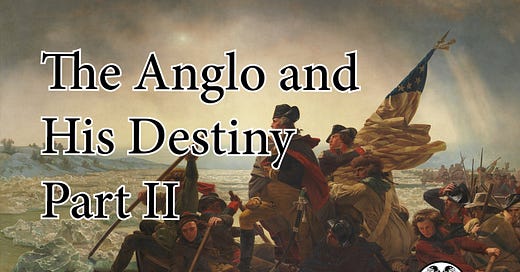Last week we laid out Polybius’ idea of Anacyclosis, or cyclical history, and modified it slightly to accord with traditional Indo-European social structures—each stage corresponds to rule in the name of one caste. This week we come to apply our framework to Anglo civilization. Its stages break down as follows:
King — The Anglo-Saxon invasions1 down to the Magna Carta (774 years)
Priest — Magna Carta down to the legalization of usury2 (330 years)
Merchant — From legal usury to the American Revolution (231 years)
Plebeian — American Revolution to present (247 years so far)
We should start by noting some differences from the classical world. First, and contra popular belief, the modern world has not seen a compression of time scales but just the opposite—Anglo civilization has proven longer-lived than either Greece or Rome. Second, and maybe uniquely in world history, Anglo civilization comprises two societies that came to regard themselves as distinct, at least in their latter phases. In reality, however, they form a continuous whole, whether linguistically, religiously, culturally, historically, and in many other ways. The classic work for understanding America through the lens of England is David Hackett Fischer’s Albion’s Seed, maybe the single most revealing work on American regional identity ever written. There is something new under the sun after all though—apart from Zhou China, I’m not aware of the locus of a whole civilization shifting geographically, certainly not from one society to another, to say nothing of it moving from one continent to another.
Differences aside, the similarities between Anglo and classical civilization are impossible to ignore. The primitive kingship of the Anglo-Saxons gives way to the “almost superhuman wickedness” of King John,3 perhaps not quite a Tarquin but not far off. The First Barons’ War set off by the annulment of Magna Carta eventually gives us a long period of aristocratic rule through the fledgling Parliament, but this pack of lions comes to be replaced by its managerial foxes during the rise of the British mercantile caste. Embodying a mix of adventurer, pirate, shopkeeper, and manager, the British mercantile class eventually gets displaced by embryonic mass democracy, which Parvini describes through the mouth of Carlyle:
Populism is the same force ‘from below’ that Thomas Carlyle discusses so often; as he put it in ‘The Present Time’ (1850): ‘a bottomless volcano, or universal powder-mine of most inflammable mutinous chaotic elements’. At that time, Carlyle with his usual mixture of despondence and contempt bet on the ‘bottomless volcano’ defeating the merchant elites of his day.4
We only disagree with Carlyle by about the space of a human lifetime. From the time of the Levellers at least,5 popular sovereignty had been an ideological force—by the American Revolution, populism was the legitimating principle of this civilization. The founders believed that they were founding a republic and warned of the dangers of a democracy, but as that emblem of MAGA Bruce Jenner reminds us, what people call themselves can be quite different from what they actually are. Recall that even centuries into the imperial period, the Romans called what they had a “republic”, right up to the very end in fact.




